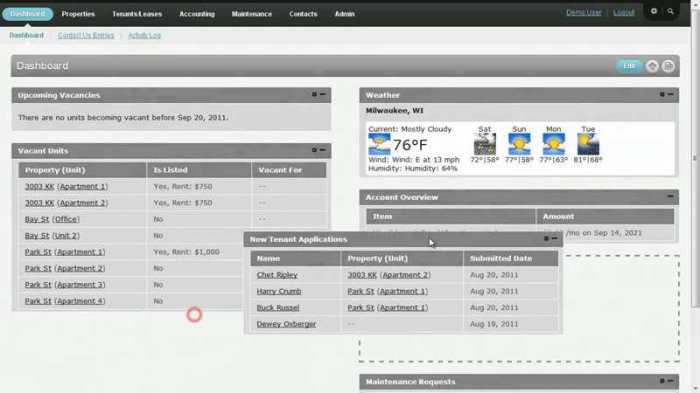Real estate back office software streamlines critical processes, from property management to financial reporting. This powerful tool offers efficiency and accuracy, crucial for thriving in today’s competitive real estate market. It significantly reduces manual tasks, allowing agents and managers to focus on client relationships and strategic growth.
This software often integrates various functions, including tenant communication, lease management, accounting, and reporting. This integrated approach fosters a more organized and responsive real estate operation, enhancing profitability and client satisfaction.
Real estate is a dynamic industry, demanding efficient management of various tasks, from property listings and tenant management to financial reporting and legal compliance. Real estate back office software plays a crucial role in streamlining these operations, improving efficiency, and maximizing profitability. This comprehensive guide explores the key features, benefits, and considerations for selecting the right software solution for your real estate business.
Understanding Real Estate Back Office Software
Real estate back office software is a suite of applications designed to manage all aspects of a real estate company’s operations. It typically includes modules for property management, tenant relations, financial accounting, marketing, and legal documentation. This integrated approach allows for seamless data flow and reduces manual data entry, minimizing errors and improving overall productivity.
Key Features of Effective Real Estate Back Office Software
- Property Management: Modules for managing property details, including address, description, photos, and relevant documents. Crucially, this should include tools for managing leases, rent collection, and maintenance requests.
- Tenant Management: A crucial component, this module allows for comprehensive tenant records, lease agreements, and communication tracking. It should also facilitate efficient rent collection and payment processing.
- Financial Management: Tools for managing income and expenses, including rent collection, invoice generation, expense tracking, and financial reporting. Features like budgeting and forecasting are beneficial.
- Marketing & Lead Management: Integration with marketing tools to manage leads, track advertising campaigns, and improve property visibility.
- Legal Compliance: Software solutions should support compliance with local regulations and lease laws.
- Reporting & Analytics: Generating comprehensive reports on various aspects of the business, including financial performance, property occupancy rates, and tenant behavior. This data-driven insight is critical for informed decision-making.
- Customizability & Scalability: The ability to adapt the software to your specific needs and future growth is essential.
Benefits of Utilizing Real Estate Back Office Software
Implementing real estate back office software offers numerous benefits, including:

Source: wondershare.com
- Increased Efficiency: Automation of tasks reduces manual effort and improves speed of operation.
- Improved Accuracy: Minimizes errors associated with manual data entry, ensuring data integrity.
- Enhanced Communication: Facilitates better communication with tenants and other stakeholders.
- Better Financial Management: Provides comprehensive financial reporting and insights.
- Reduced Operational Costs: Streamlined processes lead to cost savings over time.
- Data-Driven Decision Making: Comprehensive reporting enables informed decisions about property management and business strategies.
- Improved Tenant Satisfaction: Efficient management and communication lead to a better tenant experience.
Choosing the Right Real Estate Back Office Software
Selecting the right real estate back office software is crucial for success. Consider factors such as:
- Budget: Evaluate the software’s pricing structure and features.
- Scalability: Ensure the software can adapt to your business’s growth.
- Integration: Look for software that integrates with other systems you already use.
- Support & Training: Evaluate the support team’s responsiveness and availability.
- Security: Ensure data security measures are in place.
Real Estate Back Office Software: Case Studies & Examples
Several real estate companies have successfully leveraged real estate back office software to optimize their operations. For example, [insert real-world example, e.g., Acme Realty improved efficiency by 20%].
Frequently Asked Questions (FAQ)
- Q: What is the cost of implementing real estate back office software?
A: Costs vary greatly depending on the chosen software and its features. Consider the initial investment, ongoing maintenance fees, and potential training costs.
- Q: How long does it take to implement real estate back office software?
A: Implementation timelines depend on factors like the complexity of the system, the size of your business, and the level of customization required.
- Q: What are the security considerations when using real estate back office software?
A: Choose software with robust security measures to protect sensitive tenant data and financial information.
- Q: How can I choose the right real estate back office software for my business?
A: Consider your specific needs, budget, and future growth plans when evaluating different software options.
Conclusion
Real estate back office software is a valuable investment for any real estate business seeking to streamline operations, enhance efficiency, and boost profitability. By carefully considering your needs and researching available options, you can select the right software to optimize your workflow and drive success.
Call to Action
Ready to elevate your real estate operations? Explore our comprehensive range of real estate back office software solutions today. Visit our website to learn more and request a demo.
In conclusion, real estate back office software is a transformative solution for modern real estate businesses. By automating key tasks and providing comprehensive reporting, it empowers agents and managers to achieve greater efficiency and profitability. Investing in such software is a strategic move that unlocks significant potential for growth and success.

Source: backatyou.com
FAQ Explained
What are the common types of real estate back office software?
Different software caters to various needs, from property management systems for landlords to comprehensive platforms for brokerage firms. Some focus on specific tasks like accounting or tenant communication, while others offer a complete suite of tools.
How much does real estate back office software typically cost?
Pricing varies significantly based on the software’s features, the number of users, and the level of customization needed. It’s important to request pricing details from vendors and compare packages based on your specific requirements.
Can real estate back office software integrate with existing accounting systems?
Many modern solutions offer integrations with popular accounting software, streamlining financial data flow and eliminating redundant data entry. Ensure compatibility before choosing a solution.